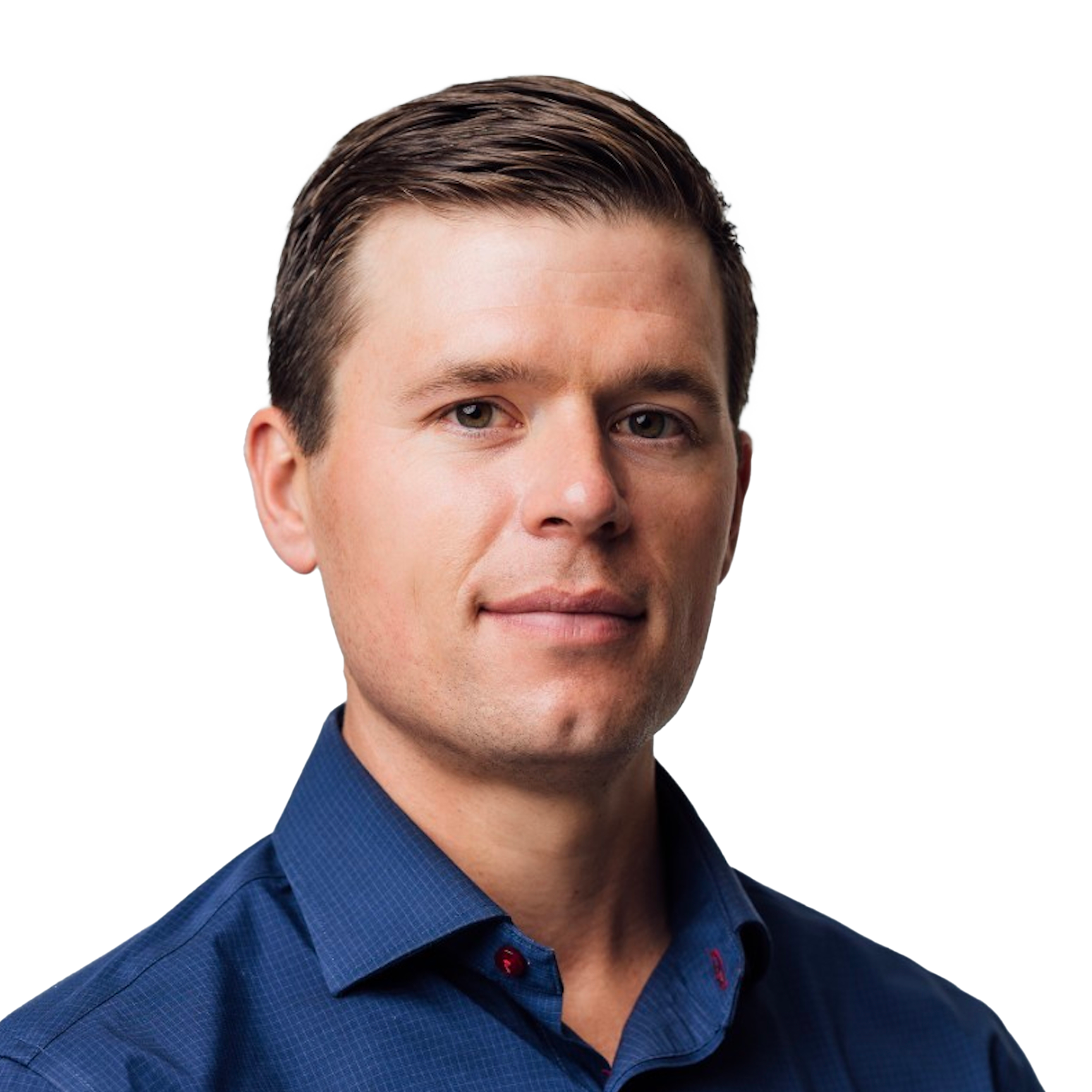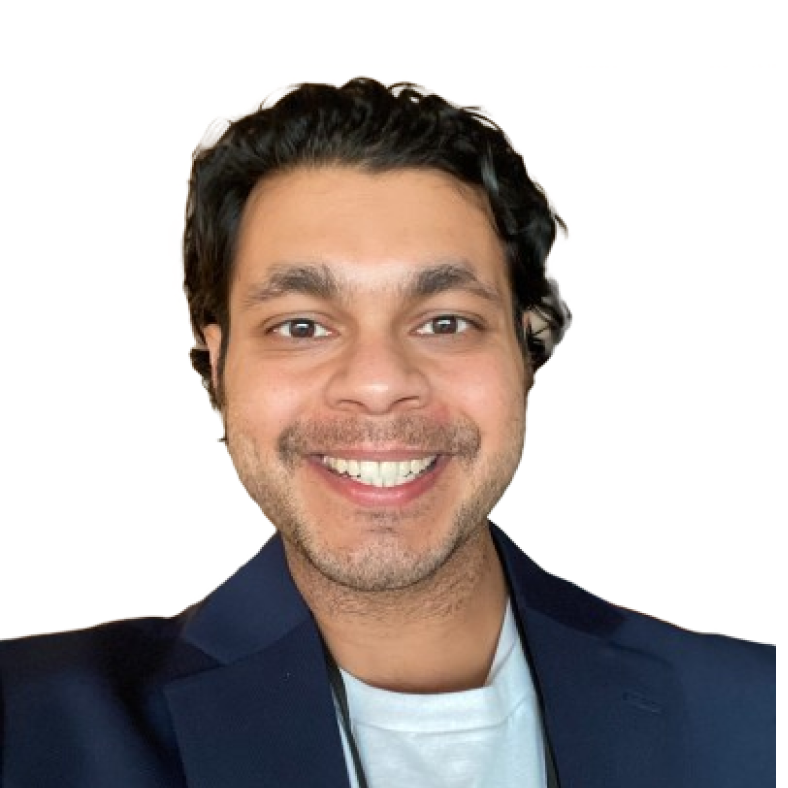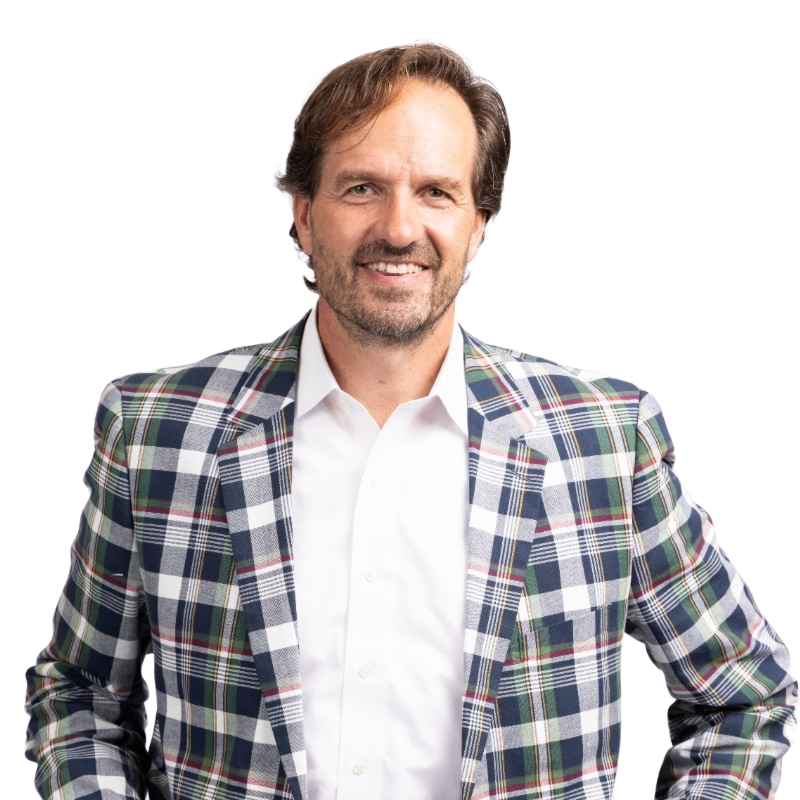
BACK TO PODCASTS
Toby Corey
Exec. Chairman/COO
|
Cruz Foam
Episode #
6
Toby Corey chats with Tracy Young about his journey, mixing personal stories and business insights. He dives into how his parents' values shaped him, especially his dad's creativity and his mom's compassion. Toby reflects on his career, from software to leading startups, emphasizing how he loves learning new stuff and tackling big challenges. He talks about the ups and downs of startup life, the importance of a tight-knit team culture, and making smart, forward-thinking decisions. Big on sustainability, Toby's really into making a positive impact for future generations, and he's all about personal growth, always pushing himself to learn and do better.

Podcast Transcript
Building for Sustainability & Impact
Tracy Young: Hello and welcome to Path to Growth, conversations with leaders on go to market.
I'm your host, Tracy Young, TigerEye. Today, we are joined by Toby Corey, executive chairman and COO of Cruz Foam. Toby, thanks so much for joining us.
Toby Corey: Oh man, I'm super stoked. It's great to reconnect with you and this is going to be a great show.
Tracy Young: Yeah, so, you know, this is a question I've actually out of the, you know, tens and hundreds of hours of conversations we've had over the years. This is a question that I've actually never asked you. Will you tell us about mom and dad, your mom and dad?
Toby Corey: I am. Are you, you must be psychic. My parents are literally out.
They got here Friday. They're leaving Monday. They live in Florida now. I think my dad's going to be 87 and my mom's 86 and doing remarkably well. The short version is, so my mother was born in St. Francis, Maine on the border of Quebec. My grandfather. Was a woodsman, chopped wood. He was in world war one.
They lived in a home with no electricity an outhouse having to pick potatoes during and on time in school. And then my dad grew up in Waterville also in the military. And he went into teaching. He taught science and was a guidance counselor for a number of years. And my mom worked for the board of education, but yeah, two younger brothers.
You know, my dad and I maybe a little bit too much alike. I think we're both creative, restless souls. So went through kind of a normal oldest son, dad clashes, but just an amazing set of parents.
Tracy Young: What did you learn from dad?
Toby Corey: I think most importantly was being a man of your word.
And what that really entailed, like what it means to be a good person, a humble person. I definitely learned a work ethic from my father, you know, early on. I remember at 11 years old in the summer to make ends meet my dad was teaching science, but he was a really good carpenter and did a lot of decks roofs and projects. I remember like digging post holes for decks and I remember coming over and measuring like I had to make 30. Had to be like, no, 32 and then like two minutes later, like, no, it's now it's 32 and a half, but an amazing work ethic. And I think I got, he's also very creative in a different way. And I just think someone who just was constantly not only challenging the status quo, but, you know, coming up with really creative ideas on how to improve things or his woodworking was amazing.
And he was always incredibly creative science teacher. I remember one time he built this board. And I think it had like 10 or 11 stations on it was one of his science classes. And this was like back in the early seventies and I had like a doorbell button and like red light bulbs and green and yellow.
And then he'd ask, I guess I played like, I guess a game of Jeopardy or something, and then this class and the first student to buzz that thing. So. I think a lot of like having a be a person of a man of your word having a really good work ethic and someone who just really like colored outside the lines and looked at things differently and and and was intellectually curious and Learned how to critically think what about mom mom was the counterbalance I always like my mother.
I definitely learned compassion I I also learned a someone who was a little bit more I just think even keel the level, I'm a type a person. My dad's definitely a type a person and I have someone I think in there kind of the matriarch of the family who also have like impeccable values. Like the most cardinal sin in my family was to lie like you could almost do anything else.
But like lying was just something like just not taught in our family and not really accepted at all. I just thought because once you basically you've done that. You can basically build a great reputation and you can build it in a nano, you can lose it in a nanosecond. So I, and she always was like, I was not a big fan of school.
I kind of excelled in my economics and computer science classes. Everything else I really hated and didn't care about because I wrestled in high school and college. My mom was definitely a stickler on like academics and school and studying. So I think she, Help balance me out in that way. I remember always was like struggling as a speller, which I still do to today.
I would, I would lose a spelling game in a nanosecond, but she literally, I remember her sitting down with me and like we drill spelling six sounded out. So we sounded out. So we're just talking about that last night. And then just some beautiful warm times. I remember Like she and I used to love the show called the Waltons and sitting, I think it was on Wednesday nights.
My dad would like play basketball with his friends and like just really special times and I had something really important or serious. She was the person that I would go to, you know, to talk about something like that. So it was like just a really, really good balance.
Tracy Young: She was like the sweet, compassionate, loving mom. So of course she went.
She was. Yeah, exactly.
Toby, with your background and just your experience, you've taken a company public. You've worked for Elon in there and like started more companies. Why CruzFoam? Tell us about CruzFoam and why it's important to you.
Toby Corey: Yeah, so a little bit of context. I think, you know, I've always I've been I've come to grips that I'm a restless soul.
And what does a restless soul mean? Someone who really does anything to fight against status quo. And I think for me, what I look for are Opportunities that are really big intellectual heavy lift. And what I found is that a lot of my excitement and passion around a company is directly correlated to like the level of difficulty.
And so I've looked for those types of opportunities. The first half of my career was all in tech and software. I. Started out as a software engineer, and then my joke is, what do they do with mediocre programmers to make them product managers? And then was it we were hiring people from MIT. My math aptitude is good.
It's not MIT good. And I'm feeling like, God, the best I can be is a mediocre programmer. I've also been really good at getting mentors in my life. And they just don't fall out of trees. There's podcast, like how to find and solicit and build really great mentors along the way. And I've been very successful in doing that.
And I remember going to speak to our VP of that department. And I said, man, I'm really frustrated. I feel like I can be an okay programmer, but not a great programmer. And he just said, Toby, what do you want to do with your life? I said, I want to run my own company someday. And he said, go into product management because it's kind of like a mini CEO.
You got to learn about like what needs in the marketplace are unmet. You got to learn everything. Not only like working with engineers, how to design, develop a product. You're going to learn about marketing. How's your product going to be marketed? You got to learn about sales, how people are going to sell your product.
And it was really like some of the greatest advice that he gave me. And then had the opportunity to run a billion dollar. Software business in the early 90s and then this thing called the internet came along and I, in a kindred spirit, left because we had a changeover in CEO. I didn't agree with the CEO's vision or where he was going to take the company and at 31 started my own company.
We grew that to the world's largest web development company doing intranets, extranets, e commerce projects for the likes of American Express, American Airlines, Apple, eBay, etc. So grew to a billion dollars in revenue, 5, 000 employees operating in 17 countries around the world. And so, and I never worked in like a McKinsey or professional services company, but the excitement of learning that business was, it was breathtaking and I found like, I really gravitate towards those things.
And then I had the opportunity to be on a board of directors, a nonprofit with Dr. Richard Leakey, who's since passed away. An amazing individual wrote the book called the sticks extinction. It's a heavy read, but it is chronically need the challenge that we have around climate change right now today.
And then really pivoted my career into more sustainability, renewable types of endeavors. I joined Solar City as their chief revenue officer. I went through my second IPO. scale the business there, got a call to go back as they were in discussions with Tesla. That was an exciting time running Tesla energy.
I got to be at plan grid spent some time with you there trying to help build a billion dollar construction business there. And I think like when I went to solar city, I knew nothing about solar zero. And I remember, you know, talking to the founders there, like, why don't you hire someone from the solar experience?
Like, we don't want that. We want people that are successful entrepreneurs that are problem solvers. And like, if you're a successful entrepreneur, you're the complete package because you can be put in almost any environment and excel. And it was stepped into that role. And like anything, I think my cardinal rule in my playbook that works for me is that I really subscribe deeply to Elon Musk's first principles.
And that is like learning the business inside out backwards and forwards. And so I literally immersed everything like the financing side of solar city is incredibly complex like learning structured finance and then and I literally like Immersed myself and learning everything about that business when I went to plan grid.
I went through the entire training program there Like learn about our product who are our customers going out on sales calls and really learning from the very lowest common denominator How that business is run so I had the opportunity very actively involved here in santa cruz with early stage companies two crazy guys, two co founders spun out of UCSC doing a research project on this biomaterial called chitin, which is a basically a byproduct of shrimp shellfish waste and a crab shell or shrimp has got a really great strength to weight ratio.
So that like crab or shrimp has, it's really hard, but also really lightweight. So they started really working with that biopolymer at the time they were working on wanting to create a bio surfboard. That wasn't why I initially invested in joining the board, but the unique idea here was that they told me that they were going to develop a material that can run on existing manufacturer equipment.
And I felt like you could kind of, if you have this technology, you could, you could pivot anywhere if, if the surfboard market isn't right, but that wasn't really because I, when I did my research, all these biofilms and biomaterials, they largely fail because they can't scale and they cost too much money.
So, you know, I remember back in the early days, hearing Elon talk about the first green tech movement in the early two thousands, Draper Fisher put a ton of money to work there. And he basically said like, no wonder these companies failed. You basically are offering inferior product that costs more. And that really resonated with me.
Like, yes, Tesla's great. Cause it's electric. That's not why people buy it. They buy it because they've transformed the driving experience. It's a great product. It's competitively priced So being someone and the mission here is that there's six billion Tons of plastic waste in our landfills in our oceans in our waters I just read an article today where microplastics are now in human heart and so with 350 million metric tons a year That's going in.
And these materials like styrofoam and polyethylene and polypropylene, they sit around for four or five hundred years. And so that was like a huge problem that I've seen for quite some time. And let me make one other point and I'll kind of answer your question why I joined here. But I look at the world through two sets of lens.
There's like what I call the tactical set, which is like, there's so many paradigms and institutions that are badly broken and antiquated. So politics is a good example of that. Unfortunately, I don't know how it is that we don't, we tend to put the two worst candidates. to face off against one another. Meritocracy is definitely not winning there.
You look at the social injustices and just the wide variety of change that needs to occur. So you can either do nothing about it or you can be tactical. So that's where like you can either vote or not, but I'm going to vote even though I don't like the system. However, then there's what I call the more strategic ones that I look through.
Which is that how do you basically change these? And you don't change them going head on like any successful company. It starts out as an organic movement that collects speed and transforms industries and businesses. Look at what the Internet did to bookstores with the Internet did to media, right? And look what Salesforce did to other client server type CRM platforms.
And in this case, what I found is Generation Z Is in aggregate, perhaps the most altruistic generation I've had the opportunity to interact with. I taught entrepreneurship at Stanford for the last 11 years. I spent a lot of time speaking to college students and they were just naturally altruistic. And then I recall when the Parkland shooting occurred, tuning into CNN and listening to these 16 and 17 year old high school students.
Articulate a gun policy that was so far superior to anything. Any Florida legislature could talk about or anyone at the, at the federal level, Senator or Congressman. And I'm like, why are these kids so smart? Part of it's because the tools are getting better and better. You have the mind of humanity in the palm of your hand here.
Like when I want to learn about something, say the Ottoman empire, I had to go to this thing called the library. I pick up this thing called an encyclopedia, the O, and look up, and I would learn a little bit about it. Just think about what you can learn about today. So like, their ability to learn, the tools they're getting, they're so incredibly powerful.
And that, that combined with like, this just natural altruism. I don't know if it's upbringing, I have no idea what it is, but I just think that they're smarter and they're aware of the challenges that humanity is facing. So, my calculus is this. I think that, as far as I know, we are the most advanced species on this planet with incredible capabilities.
Just look around you, look what we've done, look what we've built, good, bad, or indifferent. And with that comes a deep moral sense of responsibility to actually care about future generations to come. So, the calculus is like, are we creating more problems or more opportunities for future generations? I think we're creating more problems.
I want to change that dynamic. So companies like Cruzfilm that's looking to solve a really big problem really got me excited. And my checklist is really, I look at three things. Does the mission statement really resonate with me? Like what this company's ethos and the culture? Is this something that really connects to my soul?
And number two, like, do I really like the people that I'm working with? And number three, do I feel that I can come in and absolutely move the needle at the highest level possible? So, really big problem, had to learn something, I don't, I don't have a chemistry background or material science background. So, like, basically, like, the, the intellectual curiosity was like a 15 on a scale of 1 to 10.
Love the people that I'm working with, I get to work here in Santa Cruz, and so all those things factored up, and I had an opportunity to look at some other opportunities, but this turned out to be a great thing. Oh,
Tracy Young: thanks for walking us through that. I totally agree, by the way, I think this, this young generation is, So informed, they care about so many things, mostly because when we're all long gone and in the grave, they're going to be facing the consequences of everything that's happening right now.
And so they have to care because it's going to affect them and their children.
Toby Corey: And there's lots of ways to move the needle, right? Like whether it's something as visible as a Cruz Foam or there's just I just think so many ways I remember talking to you when we were discussing plan grid and like not only did you build an amazing tool that made the life of construction workers.
Better the fact that you wanted to get them so they could spend some time getting to their child's soccer game, and that's a construction software. I remember you and I talking about like, Hey, what kinds of things could we do to help promote more green building, et cetera. So there it doesn't have to be like a Tesla or Cruz Foam there's so many different ways.
Where you can impact humanity and you know, build some really great value, learn along the way and really enjoy that, the work that you're doing.
Tracy Young: So we've talked about, we've actually named a lot of really great products, right? SolarCity, Tesla, PlanGrid, CruzFoam. And so we have to start from a place with a really great product.
I mean, you always, you always told the team this. And then it's about culture and the team. So how do you think about where to invest? You know, you know, very broadly, of course, it just, it depends on the situation. But how do you think about which teams need investment now versus later, especially in the early stages of a startup?
Toby Corey: Yeah, that's a great question. Friedberg.
Who was at Google expert a number of years. He was at a venture capital firm. He went on to build weather. com and sell it to Monsanto for a billion dollars. He is brilliant. And one of the things that really resonated with me was he said that Toby, the most important thing is you have to understand what are the most important unknown questions.
In your business that you need to answer and that really really deeply resonated with me Isn't that because there is no manual and you literally have so many unknowns, but what are the most important ones? And then are you working? Really hard because the way you know on our side like we had to learn how to foam our material on on Partners machines that's really hard to like know right away.
Like oh, yeah, this stuff's gonna run the second we get we go there but the only way you start to figure out that unknown is like Focusing on and getting data And then having to either calibrate or recalibrate along the way So I think everything just really starts with like basically like what problem are you solving?
Who are you solving it for? And then what are those unknowns that you're dealing with that are so critically important to the viability and the success of your company? So in some cases it might be like early on kind of product development r and d But as you look at that, like I we run the I run the company here on on okrs Every quarter we use Trello.
There's lots of great tools out there to use that. And I think the most important thing is like aligning the company, communicating across cause you're, you're trying to move so quickly. That's one of the advantages of an early stage company. On the other hand, like. You don't have infinite cash and infinite resources.
So you have to be re you have to manage that in a really, in a really coordinated way. So I think I having a really good open culture, understanding like where the pain points are, how important those are to address either early, mid stage or later. And we also spend time talking about like, what's a P1, a priority one.
What's a P2. And what's a P3 because we're spending too much time and it's constantly looking at and reevaluating that. And like, okay, like now we. You know, really folks, we really need like a packaging engineer. And so it got to that point where it became really evident as far as spending time talking about that.
And then wanting to begin to address that. So there's, as I said, so much of the business is dynamic. We decided early on to partner with a company that is our exclusive distributor and converter here in the U S. So, and I just thought like, do I want her to want to build out a direct sales force on our own?
Like, what are we really good at? We're really good scientists and really understand how to develop, you know, breakthrough material. And so you want to tune. The business around what problem you're solving and then how to best solve that and at the same time really understanding like what creates value in your company and that maps directly to like what, what, what invest, what is value, how's value created?
Well, one basically like the simplest way to say it is that no matter what, there's this thing called DCF or discounted cash flow. So someone's going to like look at your P& L. Look at your financials and then discount that back. And then you're going to get some multiple on that based on like, wow, they have really unique differentiated technology.
Wow. There's a really big market opportunity to go here. Wow. There's a really great team that can go and address this. So. That I just think like making sure that you're holistically looking at those things, your entire company understands your vision where you're going. How about all ties together and then holding each other accountable along the way?
Because I think people that work these early stage companies, you have to be superhuman and not everyone is cut out for an early stage company or startup. And having and that I've kind of learned that through the last, I don't know, 30 years and seeing what's successful, what's not successful in terms of that, that type of people that you hire.
Tracy Young: Have you seen any patterns in the people that survive and excel in startups? What are some traits that you do well?
Toby Corey: So first of all, the, one of the things I look for, like someone that's been at a startup and preferably failed at that, because now you like, you, you know what it's like and how hard it is and you have no resources.
And so getting versus someone that's been at HP for the last 35 years of their career that's never experienced like what it's like because the culture and the dynamic is so different. I also look for people that demonstrate really good both that are intellectually curious and I asked for examples of that.
So like one of the easiest things to do is I look at a resume. There'll be some bullet points on there, things that's accomplished. I might pick one or two. Let's talk about this here. Like walk me through this. What really happened here? What did you do versus another teammate or somebody or some other player do?
So, you know, I think like the currency for the 21st century. Is really creative thinking and people that execute better than anyone else. That's what I think. And if you ever worked at Tesla, there are two things. You better be the most creative thinker. If you come to Elon with like something you just like, you know Googled and come in where you showed zero, like intellectual thought into this, that meeting's going to go really poorly.
Or if you turn your body of work better be the most thorough, the most researched, the most well written and thought out. Whether it's a PowerPoint presentation, a document or an email or what have you. And so I look for those types of trends where like, if they've written something and I look for basically like their ability to problem solve their ability to like deliver incredible results and that they can prove to me that they did X, Y, or Z, whether it's writing an algorithm or.
Someone that's been in product management and talking about a release that they may have done Or someone in sales sales a little bit easier because like that's pretty binary, right? Either you made your quota or you didn't but along that way, there's definitely a pattern That you look for like no, it starts with intellectual curiosity And then it dovetails into their problem solving and then it dovetails into basically their work product at the end of the day There's definitely ways to test that and certainly if they've had any kind of startup experience That tends to help as well.
And yeah, I think, you know, looking back, like you did an amazing job at Flangra, there was, you know, it was just some really, really talented people. The thing I'm most proud of here, quite frankly, at Cruz Foam, even though we're still a young company, about 30 employees, I'm most proud of the people that work here.
And how amazingly talented that they are, but that all emanates from like really great leadership and I just deeply believe like lead by example, right? So like if you're the one that's versus like sitting in a corner, not understanding, you know what the business does or what the customer problem is.
And so. There's definitely like a pattern of things that I look for in our hiring and learn, learn to get better at it. I was terrible at it at the beginning.
Tracy Young: Yeah, yeah, yeah. Management, I found, is just one of these things that you just get better with experience, that you can't really learn in school or through a book or through a podcast.
You just have to work with a lot of people and a lot of personalities and a lot of egos and insecurities to be able to communicate
Toby Corey: well with them. Yeah. Yeah. But I think like, but that's the other thing you look for is like how, you know, what projects have, even it could be smaller things. Like I always make sure that every month I'm working on something new.
It might even be a book and write, you know, writing some notes or how to write a haiku. Some things I'm good at, some things I'm really, really bad at. But it really is all about expanding your mind and then showing that this, this work ethic, this intellectual curiosity, because without that, then your startup has, has a lot bigger problems.
Tracy Young: Yeah, curiosity is powerful for problem solving. It's this clear mindset coming in, being curious, and just wanting to both learn more and grow. This is something you talk a lot about. Yeah. I like
Toby Corey: you. Yeah, and, and, and, Yeah, and we're and where that ends up going is that because then you start to look for opportunities where it can be applied.
So like, when I first got out of college, I worked for this company called Coleco. At the time, personal computers were just invented. We had the Atom home computers, a bunch of companies trying to get into that space. And then they shut down the electronics group. And we had this one hit wonder called Cabbage Patch Dolls.
I got moved into a project manager job where we were manufacturing all this stuff in China. So to learn about like tooling, like Sourcing of materials. I ran all like these, the scheduling. So I learned project management. Then I remember going to my first toy show and I was like 23 years old and we had a number of buyers.
So I was curious. I want to learn like who buys our products and why. And they're six months later, there was probably like a non insignificant number of product that buyers put orders in for it. And we couldn't produce them because the design team spec products that we, that we couldn't source or build in time.
So on my own, I said, this would be like an important problem to solve for this company. So I wrote a little database application. I put in there mainly it was on the material, like different fabrics and treacle pods, how to be treated. I historically looked at and inputted all of those lead times into a database app.
And I went to the designers and said, Hey, do you realize like 10 percent of our products never see the light of day? And they said, wow, we didn't really realize that. And I said, Hey, if you want to use my tools, you're designing a new product. You know, when you want to ship it, then you basically can design and inspect that product for materials that we can actually source in that window.
So no one told me to do that, but. You know, just wanting to be the best at what I do, being intellectually curious and wanting to apply it in a way. And sometimes I've applied stuff and I'd rather tried and failed than had done nothing at all.
Tracy Young: So let's switch gears a bit, a bit. So we bring in all these really talented individuals who are intellectually curious, who are solving problems for the company and building for the company in new ways.
What about bringing them together as a team? Can you talk to me about Like building team cohesiveness and team culture.
Toby Corey: Yeah. With really talented people, it's really difficult because you're bringing them in because they're, they have their own ideas and they're very strong willed people. So, you know, it's almost like, you know, like a race horse.
It's like, can run really fast. But it's finicky and there's a lot of high maintenance, right? So similar dynamic here, but one, there's some ways to look at like, are they going to be a cultural fit? But what I found is the most important thing is like actually having a strategy. That you've actually written down, right?
So like everyone understands the mission and even if the strategy is changing and why that there's always that blueprint to look at, and then it becomes really clear where you're working on some kind of structure where we're tracking accountability and a tracking tracking performance of the company, and I think you also just got to invite.
The kind of, of talent that can voice its opinion and not be afraid of any retribution or like, it doesn't matter what I say because the company's not going to listen anyway. That to me is like the biggest travesty and problem with especially early stage companies, because too many people either are drinking the Kool Aid and then, and you need, so one of the things that concepts frameworks that I taught at Stanford.
So if you take the X axis on the left side of that label, that Pessimists on the right side of the axis, label that optimist. And then on the Y axis at the top label, that credulous at the bottom label that skepticism too many people are either like optimists and credulous. So they'll believe anything the best entrepreneurs and typically the best talent fits into that.
optimistic, but basically non skeptical kind of dynamic so that you are questioning things. You are really thinking about it. And I'm always okay with good spirited debate, as long as it comes with a strong intellectual component to it versus like, eh, I don't have any data. I just feel this way.
Like that conversation is going to go bad really quickly, but Hey, I've done my homework and here's. What my research and my data shows and can we talk about that, right? So you have to have an open environment where people feel comfortable, where like, they can come have that conversation, even if you end up with differing points of view, right?
And I've done that where we've had differences of opinion. And sometimes I've been wrong. And the key is like, you can admit and say you were wrong. Like, man, I really effed that decision up. But the key is like do you stay on that or do you like hey man, like Things aren't going well We need to make a change and and my decision turned out to be not right right there, right?
And jeff bezos talks about this concept. I think it's really really important, which is there's two types of decisions There are revocable and non revocable, right? So like the the the revocable ones you can kind of mess up a little bit more It's like the non revocable ones where or the ones that are stronger Decisions that maybe burn a lot of cash or kind of take you down a rat hole.
So I think the more openness, the more transparency that you have and where people really truly feel like they have a voice, they can participate in the success of the company and understand everything that's going on, the ups and the downs. And I think like Just treat people fairly, right? So, if there's, you know, part of the problem, the dynamic is that either people are complete a holes and treat people poorly, or like you could be helping them and providing input into their career and their development.
I'd rather have that, right? Like I want good input. Constructive input, even sometimes it's like, Oh, I didn't really realize I was acting that way or had this issue or that. And, and when you have that kind of that dynamic and that kind of transparency and honesty in the company, it's, it's amazing where the company can go versus, yeah, versus like politics and people fighting one another back.
Like, Oh, I can't believe this is going on over there. That's going on over here. Cause like, it's just toxic. Especially for an early stage company,
Tracy Young: you know, you've been, you've been an entrepreneur for a long time now, a renaissance man, entrepreneur. What are the topics that we are not talking enough about in startups?
Especially in today's times, so much happening, but maybe it doesn't, maybe this is a bad question, but I guess maybe you just answered.
Toby Corey: No. Yeah. I mean, it's a good, I'm just trying to like process that because there are just so many unknowns and it's, I think from an, from an early stage company standpoint, it's really.
I think some of the challenges really are around on a product level, just really understanding what that customer need is and how to fulfill it in the most robust way possible that where you can differentiate yourself and have competitive advantage. I just see too much, on one hand, you have to be really micro focused and narrow cast, but on the other hand, if you're too focused, then I think sometimes you like lose the, lose the forest through the trees.
And that dynamic of figuring out how to constantly like not lose sight of the forest, but like you stay there too long. Then you're going to fail. And if there's too much time, like in the weeds and just seeing trees and all this other stuff that's either happening, either from a market standpoint or a competitive standpoint or a funding standpoint or a hiring capability or the myriad of things going on, I think that, you know, so I think most, especially in the early stage, it's basically like, it's kind of like start shipping the product and generate revenue.
And like, there's so many predicates that have to occur before that. Cause that's really like. That's the result. You know, it's like when you get an A, it's not like, Oh, I did my, I got or generating revenue. Oh, so it's really like, what are the activities that preceded that? Right? Like, did you have good, like sales enablement, were you able to really like understand the benefits of the product, how to overcome objections and just like everything in between.
So I think it's like, it's, it's, it's some, it's some intuition. I think some of the best entrepreneurs and leaders have this natural and toolness to them where they can tell like, this isn't good. Cause it's always hard. Like. Hey, when do I pull the plug on this? Or because sometimes like, Oh my God, my pull the plug too early.
Or I literally constantly, it almost reminds me of like, when I have like a nightmare, it's about like, Oh my God, like I never graduated college, like and failed this course. Right. And it's like so endemic of type A people. And like, a time where I'm not thinking about. You know, something new, something innovative and just like, and it's happening right now, like how to think strategically on understanding, like what, what problems are going to be ahead.
So it's like playing chess. So when I get there, I thought that through and like, Elon is a great example of that when I'm like all these other guys, just like, Hey, I just want to build a good electric car. Like he thought through like. What makes my car unique is like one of the things I can't give up is battery technology.
Started talking to a number of battery manufacturers decided he had to build his own giga factory and now it's the largest provider, largest manufacturer of lithium batteries, right? But that was a strategic thing, a big investment. Would have been a lot easier just to work on building like a great car, but that was integral to his business strategy.
He also anticipated that the number one impediment to purchase would be a charging anxiety. And so he has the most robust supercharging network and he's so far ahead of the competition. So it's not only building a great product. It's like, how do I sort of like have this can strategically see the landscape?
Anticipate what issues are going to be versus like, I get to like, Oh, I didn't think about that. And then like, then the comp, that's a three hour three alarm fire at the company. And that's what causes like lots of anxiety and work where like, you just can't burn everyone out, you know, day in and day out.
You've got to have this ability where. You're and you're not gonna get everything right. But if you start to build the strategic mindset and that's like very tactically focused. So I think like again, different sort of viewpoints, depending on like you're a large company, medium or small. But that to me is like in my experience and been through more failures than successes.
What I sort of learned along the way.
Tracy Young: And you, you know, you really touched on decades of a startup and the challenges that you could go through with product market fit and then scale and eventually how do I create a monopoly or maybe not a monopoly, but how do I control my own destiny? Can you talk about just when things get hard because startups.
And trust is so important in leadership and amongst teams, and it can be, it can be easily broken and especially when things get tough. So how do you deal with the crisis?
Toby Corey: Yeah, I think you've got to have whether it's a few people or one person that constant ability to have that shoulder to lean into. So we have gone through a lot. I ask a lot of myself. I ask a lot of my, my team members and my staff at the same token. You have to invest in developing relationships. With your people so that you can sense that things aren't really going on versus like they get so overwhelmed and quitting.
They didn't even really see that coming. So I think you have to like a big chunk of your job is investing a significant portion, like probably 20 plus percent of my time. Is it meeting and, and listening and having conversations where it's like, Hey, here's where I'm thinking about this or think about that or strategies move this way or that.
And like, but most people don't want to build that relationship and invest that time or energy. And I think like if you went in my LinkedIn profile and looked at a number of like recommendations that are on there, I think kind of what I'm known for is that Toby always like challenged me with things I never thought I could do.
And like he led by example, and I ended up doing things I never thought I could do because so much everything in life is mindset. If you only believe you can only do here, that's all you're going to get right. If you believe you can do here. If you don't set your goals, you're better off. Basically, like Coming a little short of some really audacious high level goals, then basically like, Oh, I nailed it.
And, you know, it did that because like only extraordinary companies succeed in the world. And you, and so if you're not investing that time or energy. Where people know like they're there, they just want to talk to you I spent a lot of times like we go for a walk, update, whether it's my commercial operations director, my product management head my account manager, et cetera, and like I invest that time or energy and I also let them see how I'm leading by example, whether I'm creating a presentation or writing a document.
are following through on things. So in an early stage company, you're carrying water, you're trying to be strategic and either like you thrive and love that or it scares the fuck out of you, right? Like I thrive and love that. And it's not for everybody. But the key of it is like not like hiring really well, leading by example.
And you're, you have to, you have to carve that time out. And spend that time with those people. So you build that trust, you build that confidence, you build that transparency, and they know, like, Hey, Toby, I agree with everything that I said, but I know, like, he's fair, he's objective. And I feel comfortable that I'm in a safe place that he and I can have a really great conversation.
It's a personal thing that's going on or a business.
Tracy Young: Yeah. And I got to see your leadership in action at Pine Grid. It was a tough time when you joined us. And I saw you firsthand coach a bunch of folks. And seeing their growth and their continued growth because of it. So thank you for that. It was, you know, I got to see it.
So none of us would you are today.
Toby Corey: There are so many but instantly this person came to mind and his name. So when I started at let's see, so I was at Coleco and I left there, I went to this company called Ashton Tate. They were the number one provider of PC database softwares, this product called Dbase 3 plus. And then I was in the applications group and I actually started out doing financial planning and analysis.
And And I came out of like project management when I get into product management and the vp at our division was like always like Give me a hard time stalling dragging his feet. So eventually i'm like, hey, you said you'd move me over there He's like, well, give me some crap. I don't have an mba and i'm like it doesn't matter what degree you have It's like how good are you?
Can you perform the job? So one like I always had Things that are worth fighting for you're gonna put energy and effort into it. Just nothing comes easily, right? It's extremely rare that it does so You have to have kind of a warrior spirit have some confidence in yourself. But anyway, there were I had built a great reputation.
That was great Did all of our budgets all of our financial planning and then there were three product groups There's a large one Kind of a medium one and a really small group that was just basically doing like pc utilities And I had offers from all three And I went with literally It's the smallest group.
It was a director and I was like the only person working in that group. And it was because of him. His name was Walt Feigenson. And there's two amazing things that he taught me. The first one was, and I remember to this day, it's like the four attributes and he wrote it in my first review of being a great and successful product manager.
And the acronym is F O P P. You have to be forceful. You have to be organized. You have to be a perfectionist. And you have to be a product champion. And he spent a lot of time talking about like what those four characteristics were. And like that has followed me throughout my entire career and then as a product manager you have to learn How to sell your product like you have to train the sales force and like anybody most normal people get a little bit Anx have anxiety speaking in front of a group of people And so I think I was like 26 at the time and and I had been really jaded my first When I was a freshman I wrestled, my coach put me, it's like 8 a.
m. class, he didn't want us out partying, and it was like public speaking, but the guy that taught it was like the forensics coach, Dr. Hawkins, and he like had the pipe, the tweed jacket, and the sleeves, and then you would literally like give a speech, and it would be, you'd count all your ums, all your ahs, how you rocked up there, and he basically critiqued them, he'd go up to the class and like read his critique in front of the entire class, and it'd go like D minus F.
So like it was a horrendous experience and made like this phobia about public speaking even more amplified. And he's like, look, here's how to solve this problem. He goes, at the time we had DHS cameras. He goes, you have a video camera? Because I had like a one year old daughter. I go, yeah. He goes, go home, film yourself and bring the tape in and let's start working on that.
So went home, gave this talk. Brought in, watched it, and I was horrified. I'm like, oh my god, this is absolutely terrible. So like, but again, like the way you solve problems is by breaking them down into smaller components. Let's talk about those talk about your preparation. Okay, and let's talk like kind of like he just walked me through all that got better, better and better and better.
So still like if I'm in front of a crowd, like I'd be lying to said there aren't some jitters at some point in time, but like, but that what he taught me in that development was just like great life lessons. So they weren't only like amazing business lessons. They're amazing life lessons that help basically, I think, set me up and to develop into the kind of person that I am today.
And I'm like, I'm far from perfect today, but I definitely subscribe to the Osho principle, which is like, life is short and you want to live as much of life out over your skis as much as you possibly can. That's my mantra.
Tracy Young: That is. Really good stories and a really good mantra, and I don't think we can end on a higher note.
So, that was fun, Toby. Thank you for joining us today. I really loved it.
Toby Corey: Oh, Tracy, any time. Always, yeah, always a blast.

.png)













